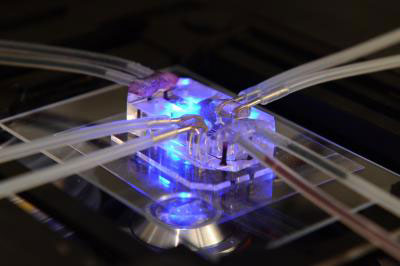| Mar 18, 2013 |
Research collaboration to develop organs-on-chips
|
|
(Nanowerk News) Today the Wyss Institute for Biologically Inspired Engineering at Harvard University and Sony DADC announced a collaboration that will harness Sony DADC's global manufacturing expertise to further advance the Institute's Organs-on-Chips technologies.
|
|
Human Organs-on-Chips are composed of a clear, flexible polymer about the size of a computer memory stick, and contain hollow microfluidic channels lined by living human cells – allowing researchers to recapitulate the physiological and mechanical functions of the organs, and to observe what happens in real time. The goal is to provide more predictive and useful measures of the efficacy and safety of new drugs in humans – and at a fraction of the time and costs associated with traditional animal testing.
|
 |
| The Wyss Institute's lung-on-a-chip, made using human lung and blood vessel cells, is a device about the size of a memory stick that acts much like a lung in a human body. A vacuum re-creates the way the lungs physically expand and contract during breathing.
|
|
"We are excited to apply Sony DADC's deep manufacturing expertise to confront one of the major challenges in the life sciences by helping to accelerate the translation of the Wyss Institute's Organ-on-Chips from the benchtop to the marketplace," said Christoph Mauracher, Senior Vice President of the BioSciences division of Sony DADC. "The Organs-on-Chips have the potential to revolutionize testing of drugs, chemicals, toxins and cosmetics."
|
|
This collaboration builds on the momentum the Wyss Institute team has gained recently on its Organs-on-Chips research program. With support from Defense Advanced Research Projects Agency (DARPA), National Institutes of Health (NIH), Food and Drug Administration (FDA), and pharmaceutical partners, more than ten Organs-on-Chips are currently under development at the Wyss Institute, including a lung, heart, liver, kidney, bone marrow, and gut-on-a-chip; there is also a major effort to integrate these organ chips into "human body on-chips" that mimic whole body physiology.
|
|
In February, Wyss Founding Director Don Ingber, M.D., Ph.D., who leads the Organs-on-Chips research program, received the prestigious 3Rs Prize from the UK's National Centre for the Replacement, Refinement and Reduction of Animals in Research for the lung-on-a-chip. This month, the Society of Toxicology awarded him the Leading Edge in Basic Science Award for his "seminal scientific contributions and advances to understanding fundamental mechanisms of toxicity."
|
|
"Our work with Sony DADC is a wonderful example of the Wyss Institute model in action," said Ingber. "We collaborate with industry to help de-risk the technologies we develop, both technically and commercially, and therefore expedite their translation into real world applications."
|

